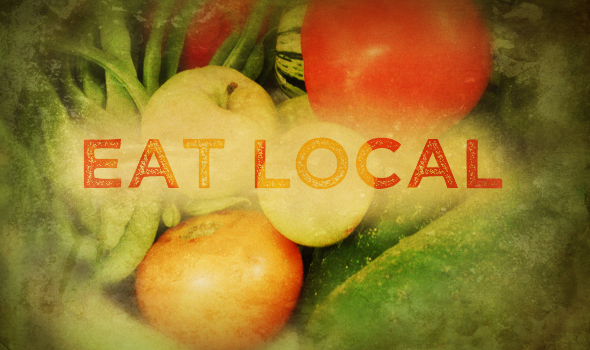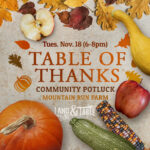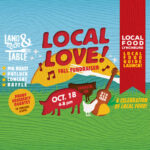Eat local: it’s what we’ve done since the dawn of time.[/caption] Intentionally focusing on eating local is all about understanding the source of our food in an effort to make choices that are more healthy for our bodies, the land, and our local economy. 1) Learn the issues Choosing to eat local is a shift in thinking. It is a reorienting of our food and money priorities. Economic, ecological, social, and personal health issues intersect our dinner table. It’s important to seek out resources, books, documentaries, etc, that can give us a rounded understanding of why eating local matters. Movies like ‘Fresh‘ and ‘Food Inc.‘ as well as books like Fast Food Nation (which is also a movie, by the way) and the non-fiction work of Wendell Berry are great places to educate yourself. There is also a wealth of websites online that you can find by searching terms like ‘locavore‘ or ‘eating local‘. 2) Grow your own One of the most common criticisms I hear against choosing to eat local and sustainable is that it is too “elitist”. Because buying healthier foods can be more expensive you may think it won’t fit into your food budget, especially lately as food prices are rising. The surest and quickest way to eat local and even somewhat organic is to grow it yourself. Choosing to be a producer and not just a consumer is the first place to begin. You can start with a tomato plant in a pot or a small garden. If you are really adventurous you can start with a few chickens (yes, even in the city). Growing your own can be economical, very rewarding and it is as local as you can get. 2) Buy cooperatively There are times when buying as a group can really save you a lot of money. For instance, if you are interested in buying local, grassfed beef it would be most economical to go in with a few other families to buy a whole cow rather than buy particular cuts a little at a time. You can also start or join a buying club. This can work for everything from raw milk cowshares (or herdshares) to farm, fresh eggs. Start by identifying what you are interested in and ask the farmer or food producer about starting a buyers club. 3) Support sustainable producers The local food movement is integrally linked with sustainable agricultural practices. Sustainable agriculture involves growing food and raising animals in a way that continually restores the land and respects the animals. Using toxic pesticides, herbicides, and chemical fertilizers is destructive over the long term and does not build the health of the soil. Also raising animals in confined feeding operations raises the risk for disease. One of the main reasons for buying local is that it makes more sense ecologically. Whenever possible support farmers who are committed to methods and means that heal the land, because if the land and animals are healthy it will translate to the food. And don’t forget to patronize restaurants and other businesses that source from local farmers. 4) Define what matters to you Eating local can mean different things to different people. For some people it means a 100 mile radius; for other people it means only eating food grown in the state; still for others they are fine if it comes from the their part of the country. You need to decide what matters to you and why. Start small and be flexible. Go into this for the long haul making changes incrementally if you need to. Decide what is important to you and begin to take steps toward your new priorities. 5) Seek the source Right now eating local is a popular trend so it seems everything and everybody wants to be in the game. The reality is though there is no certification for what local means. I have heard of produce being bought from Sam’s Club and being resold in farmer’s markets locally. It turns out the produce was from China. I’m sure most resellers in our area do not use deceptive selling tactics but many produce stands (and sometimes farmers at the local markets) are buying in bulk from North Carolina and other out of state sources. You should always inquire where the food comes from and how it is grown. The whole point of eating local is restoring our relationship with the food, the land and those who grow and produce it. Build relationships with the farmers and it will change the way you eat. As farmer, philosopher, and writer Wendell Berry has said: “Eating is an agricultural Act“]]>




